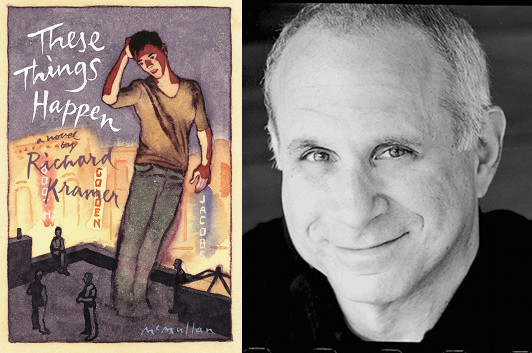Richard Kramer & The Threads of These Things Happen

photo: Dick Avery
Richard Kramer, a writer/producer for television shows like thirtysomething and My So-Called Life, describes his debut novel, These Things Happen, as “a story about a modern family, set among Manhattan’s liberal elite.” It turns out, however, that some of its characters have deep roots in his experiences on the opposite end of the country, including the things he learned when he realized he’d been taking a key figure in his day-to-day life for granted and decided to do something about it…
The birth of the book goes back twenty-five years, maybe even more. When we were doing thirtysomething, it was so exhilarating and exhausting I wouldn’t drive home at the end of the day, but I’d go instead to an Italian restaurant a few blocks from my house. I did this four nights a week, often alone so I could work on scenes for the next day. The place became a habit, and I went there even after the show’s five years came to an end; they knew me.
The person who knew me best was the man who was combination captain/maitre d’/manager. He was around forty, dressed in a blazer and striped tie, always smiling and with some nice thing to say. I would call from the set and say I was coming in, and he’d say “Great, Richard. Do you want the patio tonight, or your usual table?” When I’d get there he’d show me to my seat and immediately send out some delicious plate with a few free somethings. Looking back, I calculate I had at least a thousand meals there, which is a lot of carbonara. And—here’s how These Things Happen comes in—I realized when the restaurant announced it was closing that I didn’t even know this man’s name. Maybe I knew it once, but what did it matter? He was there to be a prince of the pleasant, dedicated to making my life a little bit nicer. He didn’t need an identity beyond that.
Seeing this shocked me. Here I thought I was such a nice guy! But I wondered: How many other people do I render invisible because it’s too much trouble to endow them with a biography? And how many people do that to me? Why do we, unconsciously, but still with some selective design, limit our imaginations about those around us?
15 June 2014 | guest authors |
It’s Always Darkest Before It Turns Pitch Black
My wife’s book club had read Herman Koch’s The Dinner when it came out in 2013, so when she saw me headed into the living room with her copy of it a while back, she predicted that I’d read through it in a single sitting—and she wasn’t that far off. (About halfway through, I had to get a glass of water.) For those of you not familiar with the novel, it’s essentially a monologue by Paul Lohman, a retired Dutch schoolteacher who, as the story begins, is out with his wife, on their way to a trendy restaurant where they’ll meet Paul’s older brother, Serge, and his wife, to discuss a situation that affects not only their respective children but Serge’s political aspirations.
Now, Paul is an extremely cagey narrator, and the story unfolds in a series of micro-revelations, so—after a few chapters—I went back to my wife, and I asked her, “This video, it’s going to turn out to be [redacted], right?†Oh, no, she assured me, it’s much worse than that. Much, much worse, it would turn out.
And, sure, some of the power of The Dinner lies in the shocking incident at the heart of the story, but only some. The greater strength of the novel is in Paul’s personality and the way it shifts from the time he and his wife leave for the restaurant to the time he returns home. In the beginning, we’re drawn in by his narration; he may be a bit closed off emotionally, but he’s smart and engaging, perhaps especially in his annoyances at the little pretensions of those around him. We may be able to identify with those frustrations, and consequently find ourselves warming up to him, taking his side against Serge’s before the evening has really begun.
It’s safe to say you’ll come to feel very differently about Paul by the end. As a narrator, Paul reminded me a great deal of Lou Ford, the protagonist of Jim Thompson’s noir classic The Killer Inside Me. I was reading The Dinner in preparation for an interview with Herman Koch, part of the “Word for Word†series at Bryant Park in midtown Manhattan, so when we met before the event, I brought this up. (I didn’t want to spring it on him in front of an audience and then find out maybe he wasn’t familiar with Thompson, after all.) As it turned out, he hadn’t read that novel, but (after The Dinner was written), he had looked up another of Thompson’s books, Pop. 1280, and he could see where people would find the common ground.
(more…)
11 June 2014 | read this |

 Our Endless and Proper Work is my new book with Belt Publishing about starting (and sticking to) a productive writing practice.
Our Endless and Proper Work is my new book with Belt Publishing about starting (and sticking to) a productive writing practice. 
